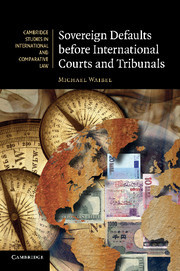Description
Sovereign Defaults before International Courts and Tribunals
Cambridge Studies in International and Comparative Law Series
Author: Waibel Michael
The last 150 years of international dispute resolution on sovereign debt offer lessons for the next wave of sovereign defaults.
Language: English
Subject for Sovereign Defaults before International Courts and Tribunals:
Approximative price 47.09 €
In Print (Delivery period: 14 days).
Add to cart
Sovereign Defaults before International Courts and Tribunals
Publication date: 10-2013
Support: Print on demand
Publication date: 10-2013
Support: Print on demand
Approximative price 122.57 €
In Print (Delivery period: 14 days).
Add to cart
Sovereign Defaults before International Courts and Tribunals
Publication date: 05-2011
421 p. · 15.7x23.5 cm · Hardback
Publication date: 05-2011
421 p. · 15.7x23.5 cm · Hardback
Description
/li>Contents
/li>Biography
/li>
International law on sovereign defaults is underdeveloped because States have largely refrained from adjudicating disputes arising out of public debt. The looming new wave of sovereign defaults is likely to shift dispute resolution away from national courts to international tribunals and transform the current regime for restructuring sovereign debt. Michael Waibel assesses how international tribunals balance creditor claims and sovereign capacity to pay across time. The history of adjudicating sovereign defaults internationally over the last 150 years offers a rich repository of experience for future cases: US state defaults, quasi-receiverships in the Dominican Republic and Ottoman Empire, the Venezuela Preferential Case, the Soviet repudiation in 1917, the League of Nations, the World War Foreign Debt Commission, Germany's 30-year restructuring after 1918 and ICSID arbitration on Argentina's default in 2001. The remarkable continuity in international practice and jurisprudence suggests avenues for building durable institutions capable of resolving future sovereign defaults.
1. Sovereign debt crises and defaults; 2. Political responses to sovereign defaults; 3. Quasi-receivership of highly indebted countries; 4. Monetary reform and sovereign debt; 5. Financial necessity; 6. National settlement institutions; 7. Arbitration on sovereign debt; 8. Arbitration clauses in sovereign debt instruments; 9. Creditor protection in international law; 10. ICSID arbitration on sovereign debt; 11. Overlapping jurisdiction over sovereign debt; 12. Sovereign default as trigger of responsibility; 13. Compensation on sovereign debt; 14. Building durable institutions for adjudicating sovereign defaults.
Michael Waibel is a University Lecturer at the University of Cambridge and the Lauterpacht Centre for International Law. His main research interests are public international law, international economic law with a particular focus on finance and the settlement of international disputes. He teaches international law, WTO law and European Union law. Dr Waibel holds Mag. iur. and Dr. iur. degrees from the Universität Wien, an MSc (Econ.) from the London School of Economics and Political Science and an LLM from Harvard Law School. He is admitted to the New York bar and holds a diploma of the Hague Academy of International Law. He has also worked for the European Central Bank, the International Monetary Fund and the World Bank.
© 2024 LAVOISIER S.A.S.



